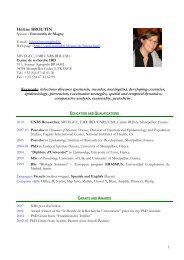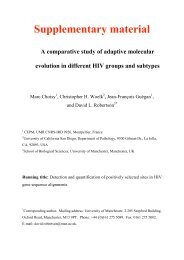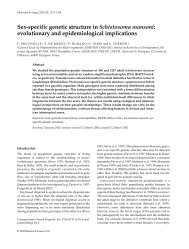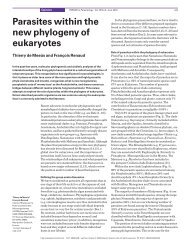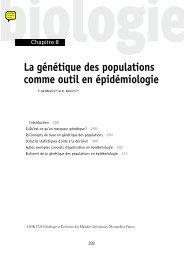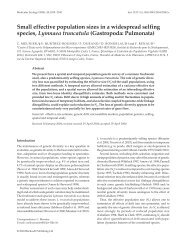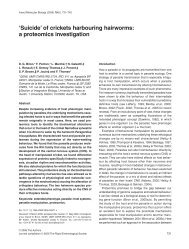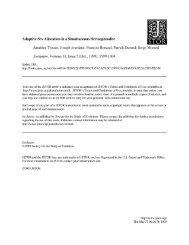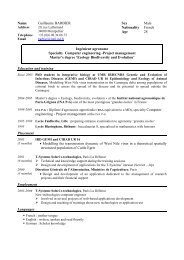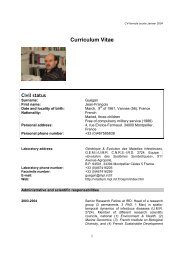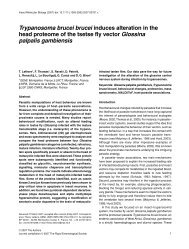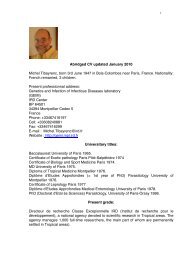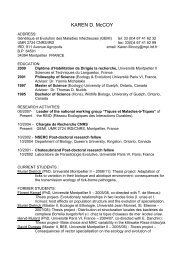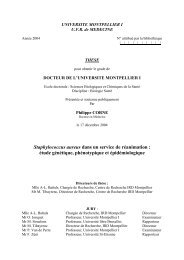écologie des virus influenza aviaires en Camargue - IRD
écologie des virus influenza aviaires en Camargue - IRD
écologie des virus influenza aviaires en Camargue - IRD
Create successful ePaper yourself
Turn your PDF publications into a flip-book with our unique Google optimized e-Paper software.
Annexe 2Ecology of ecosystems and parasites: a rec<strong>en</strong>t storyAlthough parasites were virtually ignored for deca<strong>des</strong> by ecologists, considerableefforts have be<strong>en</strong> made over the past 15 years to understand their functional importance inecosystems [15]. Although easy to overlook, parasites can sometimes account for asignificant portion of total biomass in natural ecosystems [6]. Most, if not all, ecologists andconservation biologists are now aware that the introduction or elimination of a parasite in anecosystem can strongly affect the interactions betwe<strong>en</strong> a diverse range of species in thecommunity, and h<strong>en</strong>ce affect biodiversity [7]. Most studies concern appar<strong>en</strong>t competitionph<strong>en</strong>om<strong>en</strong>a – that is, how shared parasites impact on diversity by mediating competitionbetwe<strong>en</strong> differ<strong>en</strong>t host species (Box 1) – and food webs [8,9].Very rec<strong>en</strong>tly, interest in the relationship betwe<strong>en</strong> ecosystem functioning andparasites has stimulated exploration in other directions, focusing in particular on the socalledcategory of ‘manipulative parasites’ (see Glossary). A wide range of protozoan andmetazoan parasites indeed manipulate the ph<strong>en</strong>otype (e.g. behaviour, morphology and/orphysiology) of their hosts in a way that favours their own transmission (Figure 1). Thesealterations can vary greatly in their magnitude, from slight shifts in the perc<strong>en</strong>tage of timesp<strong>en</strong>t performing a giv<strong>en</strong> activity (e.g. biting rate in Leishmaniainfected sandflies [10]) tothe production of complex and spectacular behaviours (e.g. Figure 1e) [11,12].While manipulative parasites have be<strong>en</strong> traditionally approached from the viewpointof parasitology, they now constitute a common research area of interest to bothparasitologists and ecologists. Understanding their importance significantly contributes toexpanding our knowledge of the pivotal role of parasites in ecosystems. Manipulated hostscan be se<strong>en</strong> as complex organisms since they keep some of the properties and attributes ofuninfected individuals but they also display new characteristics, involving them in noveldirect and indirect interactions with other species and/or conspecifics. Because of thissingularity, manipulative parasites have unusual ecological effects compared with ‘regular’parasites (i.e. parasites that do not manipulate their host). Our primary purpose is to reviewevid<strong>en</strong>ce for these original consequ<strong>en</strong>ces. We also outline future research needs to advanceour understanding of this emerging topic.194



